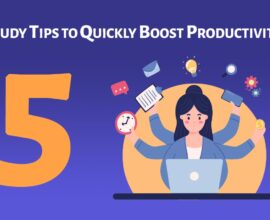Proven Strategies and Tips for Managing Anxiety at University
It’s normal to feel stressed and anxious from time to time—especially when you’re dealing with a challenging situation or are under pressure. Everything should start to improve once the stress has subsided. However, the nervous feelings can sometimes continue, leading to anxiety symptoms.
Anxiety is something that everyone experiences from time to time. When worried feelings don’t go away, happen for no apparent cause, or make daily life difficult, it could indicate an anxiety disorder.
In Australia, anxiety is the most common mental health problem. Anxiety affects one out of every four people—one out of every three women and one out of every five men—at some point in their lives. Over two million Australians suffer from anxiety over the course of a year.
The good news is that many resources and mental health support services are available to help young people stay on track. Keep reading to discover helpful strategies and resources that you can utilise right now to help you cope with and recover from anxiety while at university.
1. Try To Identify Your Triggers
Learning how to cope with anxiety at university is easier when you are aware of the situations or actions that lead to it. You can feel stressed and anxious about anything, for example, starting university, underlying health conditions, exam stress, assignment deadlines, challenging coursework, relationship conflicts, part-time jobs, negative thoughts, social events, and financial difficulties.
Here are some tips to help you in identifying your major anxiety triggers:
- Keep a journal—By writing down your thoughts and feelings, you can easily identify the events or patterns that make you anxious on different occasions
- Identify your stressors—When you’re feeling stressed and unable to manage the stress, it results in mental health problems such as anxiety and depression. Determine your daily stressors and see if there is anything within your control
- Consider past traumas—Past experiences can trigger anxiety. Reflect and identify any traumas that may be affecting your anxiety levels
Once you understand what is causing your anxiety, you can develop effective coping strategies and avoid severe symptoms, such as panic attacks and chest aches. For example, you might choose to end a toxic relationship or friendship if it is a major anxiety trigger.
2. Avoid Social Isolation
Don’t lock yourself in your room during the first year in the university or when you’re experiencing challenges. Most of us crave occasional solitude, which can be relaxing and rejuvenating. However, unhealthy or extensive social isolation can take a toll on your overall mental and physical well being.
Even if you have social anxiety and find it difficult to make new friends, it’s important to make efforts to stay connected with other students. You’d be surprised to know that you can meet life-long friends by simply introducing yourself to another student in the common area or in class.
You can also develop and maintain meaningful relationships with students who share your core values by joining clubs, sports, volunteer organisations, etc.
3. Get Quality Sleep Every Night
We know that university life can make it difficult to get quality sleep every night, but going without it will increase your risk of poor mental health and anxiety issues. One sleepless night can increase your anxiety level by 30%. Developing a regular healthy schedule for deep sleep, on the other hand, can help prevent anxiety from escalating.
When you get enough sleep for a full week, it’s like hitting a reset button on your mental health. Here are some simple strategies you can implement now to start improving your overall sleep quality:
- Establish a consistent sleep-wake pattern
- Limit your intake of caffeinated beverages and alcohol in the evening
- Avoid using your phone in bed and turn off other sources of distraction such as the TV or laptop
- Do something relaxing like yoga, meditation, deep breathing, or listen to soothing music until you feel sleepy—if you don’t fall asleep 20 minutes after getting into bed
- Consult your doctor about a medication review if you’re taking stimulants that make it difficult to sleep
- Keep your naps under one hour
4. Don’t Avoid Your Stressors
While avoiding situations that trigger anxious feelings can provide temporary relief, anxiety can worsen over time. Instead, try to cope actively by facing your stressors head-on. It may take some time to unlearn if you’ve always relied on avoidance behaviours to navigate anxiety-provoking situations and thoughts.
Here are some useful tips for replacing avoidance behaviours:
- Recognise that avoidance coping doesn’t help—When you recognise that certain behaviours don’t improve your situation, it’ll motivate you to take a different approach
- Take small steps to face or mitigate your stressors—In most cases, taking the first step is all that is required to make the task you were avoiding seem more manageable
- Ask a friend to help keep you accountable—Sometimes, all you need during stressful situations is a little nudge from a supportive friend. With their support, you can follow through with your plans of replacing avoidance behaviours
- Learn to tolerate uncomfortable thoughts and feelings—Accepting emotional discomfort puts you in a problem-solving mode. Instead of avoiding the thoughts you’d rather not experience, you’ll find more effective ways to deal with the stressor
- Think long-term—If you are struggling with an assignment or homework and don’t turn it in on time, it may negatively affect your grades. It’s best to reach out to your professor or seek help from professional tutors instead of postponing
5. Cultivate a Healthy Lifestyle
Self-care habits like taking care of your physical health are important in regulating mood and overcoming anxiety. You might try a variety of strategies to deal with your anxiety. What works for one person may not work for another, and finding the best tactics for you may take some time. However, if your anxiety is proving tough to manage, you can always get expert help.
Tactics that may help ease some symptoms of anxiety could include:
- Join a regular exercise program, take a few minutes to stretch in the morning, or go for a walk outside each day
- Eating healthy foods
- Reducing small everyday stressors
- Keeping in touch with your friends and family regularly
- Bonding with your pet
- Creating time to unwind or doing small things that you enjoy
6. Create a Study Plan
Workload is a significant source of stress for university students. If you procrastinate in the hopes of catching up, your assignments and homework will pile up quickly, forcing you to pull all-nighters. That’s when the anxiety kicks in.
Making a study plan is the best way to manage your workload, gain control of your time, and keep anxiety off. An effective study schedule enables you to:
- Plan ahead of time
- Break down large assignments into manageable chunks
- Allocate sufficient time to each important task
- Keep track of your progress
- Get some downtime
If you stick to your study schedule, you won’t experience the anxiety of having too much work to do at the last minute.
7. Practise Mindfulness
Mindfulness is a practice that taps on your ability to be fully present and less reactive to the stressful events happening to you or around you. Even if you can’t change your situation instantly, for instance, financial difficulties, practising mindfulness enables you to change your response to such stressful events. It allows you to feel and acknowledge your worries, explore the source of your worry in a safe environment, and find a proactive approach to the challenge.
8. Talk to Friends and Family
Your family and friends will always be there for you. Talking to them about what you’re going through can help them to understand your situation better. The helpful advice and extra support they provide can help make a big difference when you’re experiencing anxiety at university.
If you’ve connected with other students in university, talk to them. You’ll be surprised to learn that you’re not the only one experiencing anxiety, and it will help you feel less isolated. Most students have likely experienced anxiety symptoms at one time or another and having someone nearby who understands what you’re going through can be incredibly helpful.
9. Reach Out to Your Professor
When you’re struggling with anxiety or any other mental health issue, it’s easy to fall behind in class, jeopardising your grades. If you find yourself missing assignment deadlines or failing to attend a class that has participation points, you can try to schedule an appointment with your professor during office hours or send an email.
When contacting your professor, keep the following in mind:
- Be clear about your intention for the conversation. For example, do you want to request extra time on an assignment? Do you want extra academic assistance?
- Explain what you need directly and ask about their availability for the conversation
- Express how the situation is affecting you without going into too much detail about your mental health
- Mention how it will help you if your request is granted
- Remember your request may be denied or accepted. Either way, thank the professor for the time
10. Seek Mental Health Support From Professionals on or Off-Campus
If you are still experiencing prolonged anxiety or more severe symptoms like anxiety attacks, it’s good to seek professional help.
Universities take student mental health very seriously. They have trained professionals and resources on hand to provide treatment and practical advice to help students cope with the anxieties of university life. All you have to do is explore the available local services on your campus or contact your GP, and they’ll refer you to the right professional.
You can also access mental health support and resources from off-campus sources, such as:
- Beyond Blue (1300 22 4636)
- ReachOut
- Lifeline (13 11 14)
- SANE Australia (1800 18 7263)
- FriendLine (1800 424 287)
Bottom Line
Learning to cope with anxiety and other mental health problems will improve your overall university experience. Remember that what works for one student may not work for another, so take your time to find strategies, routines, and habits that work best for you.
Most importantly, be kind to yourself and don’t suffer in silence. Utilise the numerous resources and professional support available both at the university and external organisations. There are many ways to help manage anxiety, and the sooner people with anxiety get support, the more likely they are to recover.
For your academic needs, like homework help, we’ve got you! Use our online study platform, Zookal Study, to help take the stress out of your studies.





